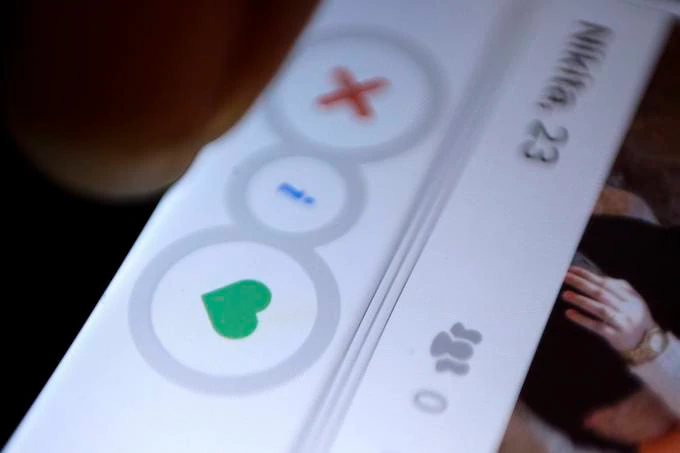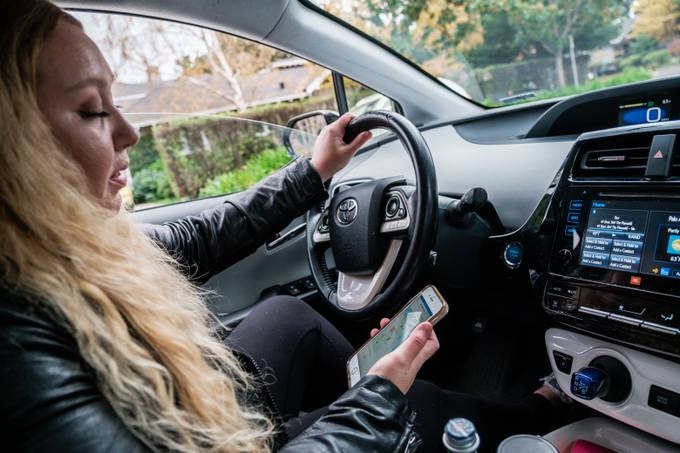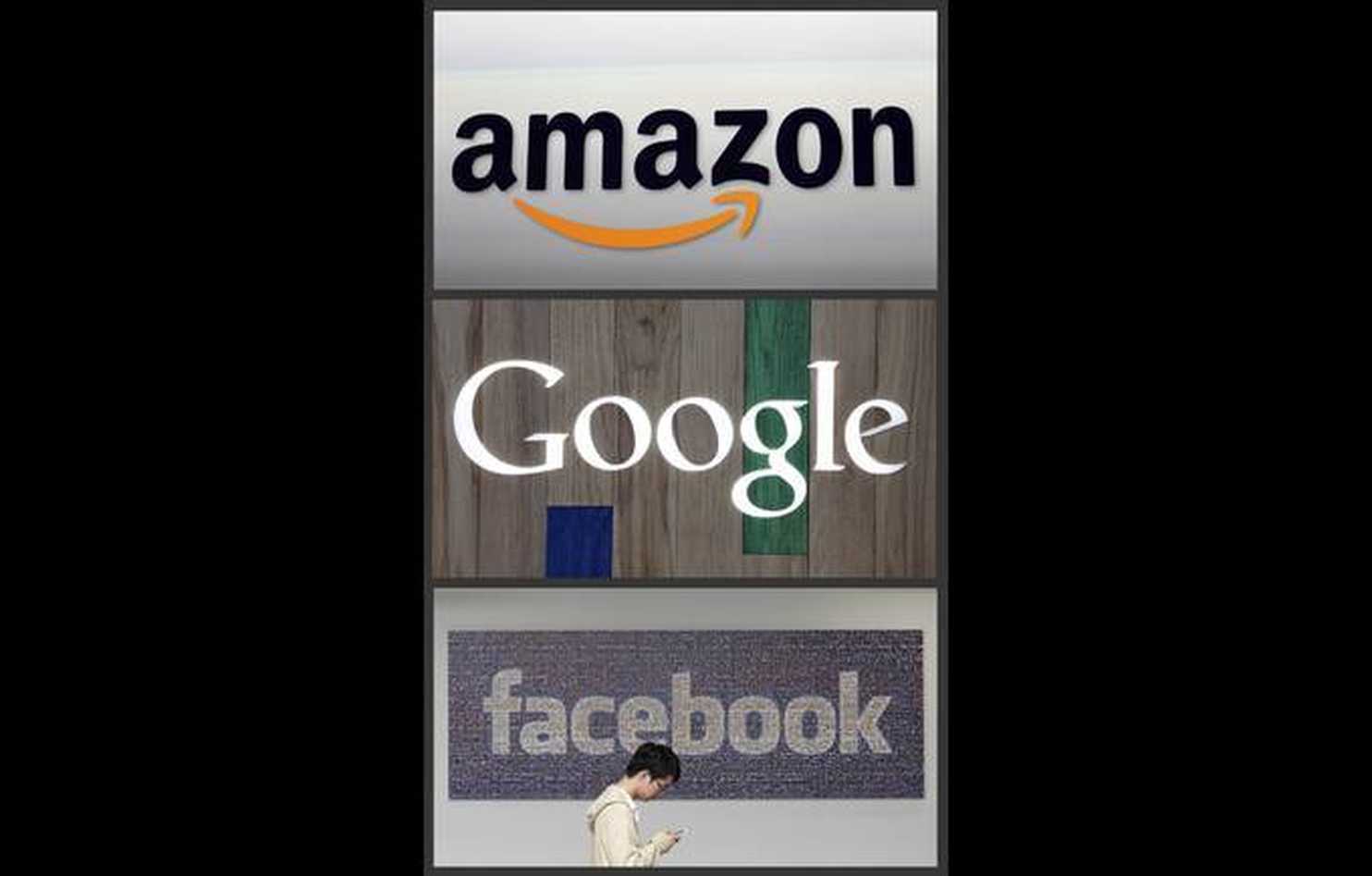Readers: We’re continuing to track the many ways the coronavirus is impacting the tech industry in the newsletter. Email or DM me about the ways covid-19 is impacting you or your company.
With Tonya Riley
This photo combo of images shows the Amazon, Google and Facebook logos. (AP Photo, file)
Ctrl + N
Most Americans believe that Big Tech has too much power, according to new polling released this morning.
The fresh data from Gallup and the John S. and James L. Knight Foundation underscores how public opinion is shifting about Silicon Valley. Growing concerns that misinformation and other issues on social media are tempering the optimism many Americans once had about the industry.
Here some of the survey’s key findings:
— Americans think Facebook, Google, Amazon and Apple have too much power: 77 percent of respondents share this sentiment, across all demographic and political groups. But they’re split on what to do about it: 50 percent favor breaking the companies up, while 49 percent oppose government intervention.
— Their top concern is misinformation spreading online: 74 percent of Americans are very concerned about the spread of misinformation on the Internet. There’s a partisan gap: majorities of both Democrats (84 percent) and Republicans (65 percent) are very concerned about this issue, but Democrats are more concerned about the issue.
— Americans don’t have faith social media companies can fix the problem: They don’t trust social media companies much (44 percent) or at all (40 percent) to make the right decisions about what content should or should not be allowed on online platforms.
— But Americans don’t think government is up to the task either: 59 percent of Americans believe elected officials and political candidates are paying “too little” attention to issues dealing with technology and technology companies. They would still prefer the companies (55 percent) to make those decisions about what content should be allowed online rather than the government (44 percent).
The polling helps explain why proposals to regulate Big Tech have become a popular talking point among politicians on both sides of the aisle. But it also illustrates why it’s been so difficult for lawmakers to actually pass meaningful privacy, antitrust or election transparency legislation. There’s broad consensus there’s a problem, but little agreement about how to solve it.
“The techlash is real,” said Sam Gill, senior vice president and chief program officer at Knight Foundation. “People are concerned about major tech companies and their effects on democracy. But they are deeply divided on what should be done.”
That creates a challenge for those seeking to campaign on tech issues as November approaches. Already misinformation on tech platforms and their responses to it is emerging as a key issue on the campaign trail. Former vice president Joe Biden, for instance, who just scored a key victory in Michigan and several other states, has been very critical about Facebook’s handling of falsehoods on its service.
Earlier this week, the campaign criticized the company for not immediately flagging a deceptively edited video shared by White House social media director Dan Scavino. Twitter labeled the video as “manipulated media” hours before Facebook did.
“Facebook’s malefesance when it comes to trafficking in blatantly false information is a national crisis in this respect,” Biden campaign manager Greg Schultz said. “It is also an unconscionable act of putting profit above not just our country, but every country.”
But expect Republicans to continue to seize on these issues as well. While less concerned about misinformation, the polling found Republicans tend to be more critical of technology companies than Democrats and independents. That also played out this week as the Trump campaign wrote a letter to Twitter complaining about the application of the label to Scavino’s post, which hadbeen retweeted by President Trump, and requesting a label be applied to a video shared by the Biden campaign. The company said Tuesday it intends to address these issues.
The techlash also continues to be felt on Capitol Hill. Lawmakers on the Senate Judiciary Committee yesterday blasted Google and Amazon at an antitrust hearing, per The Verge’s Adi Robertson . Expect to hear more criticism of Big Tech today as senators on the same committee hold a hearing on the EARN IT Act, a bill with bipartisan sponsors that aims to curb child exploitation online.
BITS, NIBBLES AND BYTES

U.S. President Donald Trump (Photographer: AL Drago/Bloomberg
BITS: The White House plans to convene top tech companies today to discuss the coronavirus outbreak, my colleague Tony Romm reported for the coronavirus live blog.
The meeting, hosted by the Office of Science and Technology Policy, will give technology companies a chance to highlight their efforts to combat the coronavirus. The meeting will include representatives from: Facebook Apple, Google Amazon, Microsoft and Twitter and select federal agencies. The companies declined to comment or did not immediately respond to requests.
The meeting could also address the role tech platforms play in spreading accurate public health information about the disease.
For instance Facebook CEO Mark Zuckerberg’s Chan Zuckerberg Initiative announced yesterday it would help fund testing efforts in the Bay Area. The Chan Zuckerberg and Gates initiatives have also poured money into developing testing technology.
Tech companies continue to grapple with the fallout from the virus on their businesses. Google yesterday recommended that all workers in North America work at home to diminish the risk of the coronavirus spreading, my colleague Meryl Kornfield reports in the live blog. Offices will remain open for employees with jobs that require on-site work.

According to his Apple Watch, Geoffrey Fowler rarely ever gets up out of this seat in his work-from-home office.
NIBBLES: Companies across the country are urging workers to stay at home to avoid spreading or catching the coronavirus. But Post columnist Geoffrey A. Fowler found that even the growing number of on-demand conveniences and smart devices haven’t exactly made “Netflix-and-quarantine life” easy.
“Quarantine might not seem like a big sacrifice, but my experience shows it’s no snow day,” Geoffrey writes about his eight-day experiment. “It lays bare the vulnerabilities — and the vulnerable — in our online-everything economy.”
For instance, on the third day of working from home Geoff’s Internet went down, a scenario that could become commonplace as networks designed for home use see an uptick in remote workers, he writes. To get groceries and food, Geoffrey relied on DoorDash and Instacart. Both companies began promoting “contactless” deliveries, but the coronavirus has highlighted inequities in pay and health care the workers face.
One of the biggest challenges was staying sane in the face of social isolation, Geoffrey writes. “A group of tech workers and journalists working at home experimented with a version of that on Monday: A 5:00 #WFHHappyHour streamed over Zoom video,” he writes. “Sadly, when I joined few participants seemed to actually have cocktails.

A man uses the dating app Tinder. (AP Photo/Tsering Topgyal, File)
BYTES: Online dating company Match Group will throw its support behind legislation that could strip tech companies of their liability protections in testimony at a Senate Judiciary hearing today, Dan Primack and Margaret Harding McGill at Axios report. The company’s support is an outlier in the tech industry, as trade groups and privacy advocates warn the legislation, which aims to limit child exploitation, could deal a blow to encryption.
“We don’t casually lend our support to this legislation. We do it recognizing there is no cure-all to keeping the internet safe, just as there is none for keeping the world safe,” Match chief executive Shar Dubey wrote in a memo published to the company’s website. “But, even still, we have to do every bit we can.”
Match Group announced its support for the legislation as members of the House are currently investigating its companies for how they handle child predators on their apps.
The Senate Judiciary Committee today will hear opinions from legal experts, child safety advocates and industry lobbyists at the hearing about the bill today.
Elizabeth Banker, deputy general counsel at tech lobbying group the Internet Association, will also testify. Unlike Match, which is a member of the trade group, Banker will argue that the legislation opens the door for government officials to force clients like Google and Facebook to weaken or refrain from using encryption, according to testimony shared with The Technology 202. She will tell Congress that federal mandates on how companies search for abusive images could create a legal loophole that would make evidence collected by tech companies easier to dismiss in court.
FAST FWD
— News about tech workforce and culture:

MENLO PARK, CA – NOVEMBER 14: Instacart shopper Vanessa Bain (Photo by Nick Otto for the Washington Post)
Instacart announced that it would begin offering accrued sick pay for roughly 12,000 part-time workers, my colleague Nitasha Tiku reports. For both part-timers and independent contractors, who both shop and deliver the food, Instacart said that for the next 30 days, it would offer up to 14 days of pay for those diagnosed with COVID-19 or placed in mandatory isolation or quarantine, as directed by state or local officials. (Uber and Lyft also offered something similar.)
But drivers for these services are skeptical they will be able to access the services. Vanessa Bain, an independent contractor for Instacart who has helped organize strikes against the company, says the company has not clarified what 14 days of pay means. In the meantime, Instacart has also been offering high bonuses to incentive shoppers in the Silicon Valley region where Bain works.
The company has also failed to provide workers with supplies to keep them safe, Bain tells Nitasha. Bain and her husband, also an Instacart worker, have had to find their own gloves and have had to use Everclear to disinfect because they are running low on hand-santizer.
“We’re doing what we can to try and keep ourselves and ours customers safe with proper training and supplies.”
Instacart, the grocery-delivery app, was one of many tech companies publicizing new safety benefits for workers concerned about coronavirus this week, after pressure from regulators like Sen. Mark Warner (D-Va.). DoorDash and Postmates also announced new policies this week.
DoorDash will provide “up to two weeks of assistance to Dashers and Caviar couriers who are diagnosed with COVID-19 or who are subject to quarantine at the direction of public health officials,” the company said in a statement to The Verge. Postmates created a fund that will credit workers for the costs of doctors appointments and medical expenses related to COVID-19’s impact in over 22 states, the company announced yesterday.
PUBLIC CLOUD
— News from the public sector:
PRIVATE CLOUD
— News from the private sector:
#TRENDING
— Tech news generating buzz around the Web:

Are our brains evolutionarily equipped to process so many random faces each day on TikTok and Instagram?
BuzzFeed News
@MENTIONS
- Center for Democracy & Technology (CDT) announced that Alexandra Reeve Givens has been named President and CEO, according to a news release.
CHECK-INS
—Today:
- The Senate Committee Judiciary will hold a hearing Wednesday on “The EARN IT Act: Holding the Tech Industry Accountable in the Fight Against Online Child Sexual Exploitation” on Wednesday at 10:00 a.m.
—Coming up:
- FCC Commissioner Geoffrey Starks and FTC Co missioner Rebecca Kelly Slaughter will jointly host a field hearing in Detroit, Michigan on 5G technology and big data on March 16 at 1 p.m.
- The Game Developers Conference will take place in San Francisco March 16-20.
—Postponed:
- Nava Public Benefit Corporation has postponed tonight’s event “Impact at Scale: From Big Tech to Civic Tech.”


















